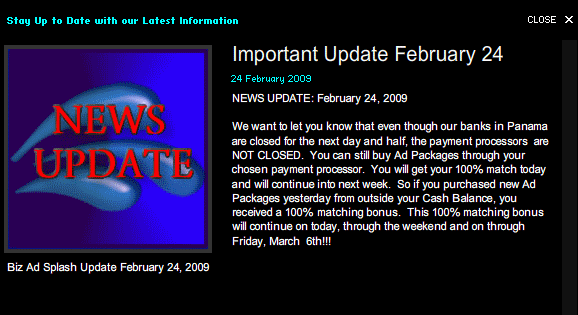Stanford Ponzi Scheme Is Affecting Autosurf Trade
When the Securities and Exchange Commission charged R. Allen Stanford Feb. 17 with operating a multibillion-dollar fraud scheme through his bank in Antigua, the news created banking pandemonium on the tiny Caribbean island and also in Panama.
In the days that followed, a surf known as BizAdSplash referenced the banking situation in Panama without referencing Stanford by name.
BizAdSplash was one of three surfs that came to life in the months following the seizure of funds tied to AdSurfDaily Inc., a surf registered in the United States and accused of running a $100 million Ponzi scheme.
One of the key sales points of BizAdSplash was its purported offshore location. Two other surfs — AdViewGlobal and AdGateWorld — also bragged about being offshore. Promoters for the surfs said the offshore locations provided protection from the SEC, the IRS and state attorneys general. Promotions for the new surfs repeatedly referenced ASD.
“We want to let you know that even though our banks in Panama are closed for the next day and half, the payment processors are NOT CLOSED,” BizAdSplash said on Feb. 24. “You can still buy Ad Packages through your chosen payment processor. You will get your 100% match today and will continue into next week.
“So,” BizAdSplash continued, “if you purchased new Ad Packages yesterday from outside your Cash Balance, you received a 100% matching bonus.
“This 100% matching bonus will continue on today, through the weekend and on through Friday, March 6th!!!” the surf exclaimed.
On Feb. 27 — just three days later — BizAdSplash told customers it was ending its affiliation with StrictPay, a payment processor with Panamanian ties, but again did not mention Stanford or refer to the regional banking crisis.
“We are suspending the use of the Strict Pay Payment processor,” BizAdSplash said. “This is due to Strict Pay having some technical difficulties at this time. If you have requested a cash out using Strict Pay this past week, please change this and any future cash out request to one of the following: Alert Pay, Solid Trust Pay or Bank Wire. Please note that using the bank wire, the minimum to cash out is $1,000. Until Strict Pay has corrected the problems we will not allow this processor to be available.”
Alert Pay and Solid Trust Pay are payment processors headquartered in Canada, and friendly to the autosurf trade.
AdSurfDaily is another surf with Caribbean ties. Federal prosecutors said ASD had more than $1 million on deposit in Antigua. After prosecutors made the claim, ASD President Andy Bowdoin told members that $500,000 of the sum was a deposit that enabled ASD to process credit-card orders.
Bowdoin never referenced Antigua until prosecutors referenced it first.
ASD said it relied on the expert guidance of attorney Robert F. Garner. The Feds now say Garner was a shill for ASD, and Garner has advertised his legal services to help companies establish a presence offshore.
The extent of the problem the alleged Stanford Ponzi has caused surfs is unclear. But several surfs that purport to be operating offshore have collapsed in recent days

The real reasons here are in the payment processors. Strict Pay is Panamanian in much the same way East St Louis is, but in the wake of the last few offshore banking scandals these previously scam friendly banking and tax havens have finally gotten religion and are finally taking in interest is whether their countries are on the road to being Nigeria, a place that the mere mention of discourages any serious business from reading further. Perhaps they realized either on their own or with a little encouragement from another big country that is not off shore that they are going to have to choose if they prefer to be the offshore haven for scammers and psuedobanks that only do business with people who don’t want any way for customers can track their spending or get refunds when they are stolon from or if they’d like to continue to have access to the regular US Banking infrastructure. They can no longer have it both ways, and it looks like some of them are making their choice.
If that is the case, and the central and south american banks are beginning to realise that they have to make this choice, it will be a double blessing – both for the about-to-be-scammed and for the reputations of those countries involved. Legitimate companies who are looking to invest overseas look for countries with good records on banking and corruption.
Another ponzi friendly payment processor has been having problems recetly as well. Liberty Reserve, possibly the most ponzi friendly payment processor is reported to be having a DDOS attack.
There has been some speculation as to who the owners of Liberty Reserve are. This article claims that the owners are persons who may be familiar to some:
http://www.ecommerce-journal.com/news/11437_lr
Basically it suggests that the owners are: Arthur Budovsky and Vladimir Kats aka Ragnar Danneskjöld. These two people were arrested a few years ago in relation with a money transfer operation in New York.